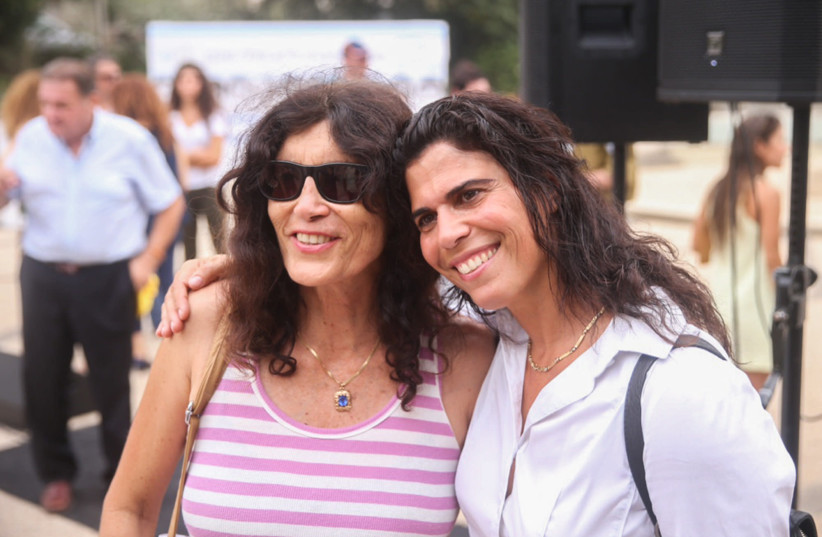It’s been taking place with increasing frequency, but once again, the accomplishments of Israeli athletes have filled the country with pride.
At the European Athletic Championship in Munich, the most significant global competition besides the Olympics, medals have been coming in a flurry for Israel. Israeli gymnast Artem Dolgopyat, who won gold in the floor exercise at the Tokyo Olympics last summer, struck gold again. This was Ukrainian-born Dolgopyat’s seventh medal in the floor exercise and his third gold.
He topped an impressive lineup of medal winners at the 10-day competition, which has turned out to be Israel’s best-ever showing in the major event. Hanna Minenko won the bronze medal in the triple-jump. Marau Teferi and Gashu Ayale took silver and bronze respectively in the marathon, and Israel’s men won the team gold, with two other runners – Yimer Getahun and Girmaw Amare – finishing seventh and ninth respectively. Lonah Chemtai Salpeter also won bronze in the women’s 10,000-meter competition.
It’s a far cry from the days when Israeli teams would come away with no medals. There’s been a slow change that has emerged over recent years that attaches more importance to the accomplishments of Israeli athletes.
Yael Arad, Israel’s first Olympic medalist (with a silver for judo at the 1992 Barcelona Olympics) and the current president of the Olympic Committee of Israel, told a Jerusalem Post conference in England earlier this year that Israeli athletes were constantly improving.

“Israeli sports is for sure getting better over time. It isn’t just the medals we are winning, but the amount of finals our athletes are reaching, which is really a great indication of growth,” she said.
The Committee, founded in 1986, is responsible for sending the Olympic delegations to the Olympic Games (summer and winter for adults and youth, and the European Games for adults and youth) and is the umbrella organization for Olympic sports in Israel. Its budget for 2021 was reported as NIS 48,273,701, which is tiny compared to countries of similar size. Bruria Bigman, head of marketing and public relations for the committee, told the Post last year that some 40% of that budget came from sponsorships of business entities, donations in Israel and around the world.
Prize money
To its credit, the committee has set reasonable prize amounts for medal winners. For the 2016 Rio games and the 2020 Tokyo games, a gold medal winner (like Dolgopyat) received NIS 850,000 in grants. That amount was split between the athlete (NIS 500,000), the coach (NIS 250,000), the training staff (NIS 50,000), the sport’s union and the sport’s federation (NIS 25,000 each).
A silver medal would receive NIS 680,000, with NIS 400,000 going to the athlete and a similar split to the various other parties. For a bronze medal, the Olympic Committee earmarked NIS 425,000, with the athlete taking NIS 250,000 of that.
For athletes making the finals, Israel significantly raised the reward amounts from the 2016 Rio Olympics. For fourth place, athletes in 2020 received NIS 120,000 (vs NIS 80,000 in 2016), fifth place received NIS 96,000 (vs 64,000), sixth garnered NIS 80,000 (vs 48,000), seventh earned NIS 64,000 (vs 40,000) and placing 8-12 was worth NIS 48,000 (vs 32,000 in 2016).
However, when contrasted against a lifetime of training that often precludes earning income from a day job, the prize money only goes part of the way in meeting the athletes’ expenses.
Timna Nelson-Levy, an Israeli judoka who competed in last summer’s Olympics this summer, told the Post’s Tamar Uriel-Be’eri that every aspect of her life is judo. “It’s very hard, it demands everything; to sleep right, to eat right... My life revolves around this 24/7,” she said, adding that unless an athlete receives a corporate sponsor, it’s almost impossible to dedicate enough time for training.
“As a kid, my parents helped me however they could, if there was something I really wanted, but they couldn’t give me everything I wanted. I say this with a lot of pain: The state does not help Olympic sports people. Olympians must be given as much as possible because we are the face of Israel,” she said.
So while we can bask in the wonderful achievement of our accomplishments in Munich, we can only wonder what Israelis athletes could have achieved if they had received even more support during their long, arduous years of training.
